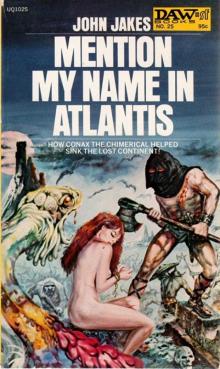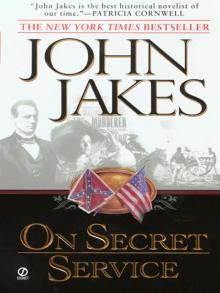- Home
- John Jakes
Homeland Page 6
Homeland Read online
Page 6
“So?”
“So the statue isn’t gold. I’ll show you, I have a picture of the real thing.” He started to rummage for it, but the Neulander abruptly told him what he could do to himself. The man snatched the pamphlet and stalked off.
On the pier, remembering, Pauli sighed. So many thieves, Germans, preying on other Germans. He had expected better from his countrymen, and the world.
The Auswanderung, emigration, had been a fact of German life for more than forty years. It had sundered families, depressed the economy in certain parts of the country, and had even become a hot political issue several times. Aunt Lotte had told Pauli that hundreds of thousands had already gone, including his uncle, and the tide showed no sign of slowing. Gazing around the pier packed with the Auswanderer, he believed it.
The outcome of a journey to America wasn’t always happy. He had learned that somewhat depressing lesson from a traveler who sat down on the same bench in the ticket hall. This was just a half hour after Pauli’s train arrived; he’d gone directly to the hall to check in and have his ticket stamped. Then he’d sat down to examine it.
The man seated next to him uttered a weary sigh. Lonesome after the long rail journey among strangers, Pauli spoke to him. “Are you going to America, sir?”
“I’m going home to Wuppertal. My brother is supposed to meet me here with train fare. I’ve just come from America.”
The traveler was an old man. Not old in years but old in the face, his skin seamed with worry lines, his eyes sad. “Are you going there?” he asked.
Pauli replied with a vigorous nod. “Definitely.”
“Thousands go, but hundreds come back. They never tell you that, do they? I was in St. Louis for twelve years. I hated every moment. I’m a baker. There are a lot of bakers in America. Too many. I barely made enough to keep myself alive. One Easter my shop was completely looted at night. I almost came home then. I hated every moment.”
“I’m very sorry you had bad experiences, sir, but they say in most respects it’s a wonderful country.”
“Oh, no. The people aren’t your own kind, but all kinds. They throw out everyone’s traditions as quickly as you or I would throw out slops. They tear everything down in America. They tear down buildings ten years old, they tear down whole neighborhoods for new boulevards, they tear down any person with a new or unpopular idea. For a while after you arrive you’ll think everything’s wonderful. But soon enough you’ll see the dirt and despair—the truth behind the illusion you’ve created for yourself. You and all the rest of these cattle. If I were you I’d save myself grief and cash in my ticket, now.”
“I can’t do that. My relatives are expecting me in Chicago. That’s my new home.”
“Well, in a few years, you’ll be back to stay. Count on it.”
Pauli excused himself and moved away quickly. He wished he’d never met the baker of Wuppertal.
The day was waning. The sounds of the harbor—the mighty ship’s horns, the screech of tug and barge whistles, the crisply rung bells—grew less exciting every moment.
On the vessel, amidships, a bell rang. People exclaimed and pointed. Pauli jumped on the packing box to see. Sure enough, back at the gangway for the cabin-class passengers, the velvet rope had been removed. Well-dressed ladies and gentlemen with their families were proceeding aboard with much waving and laughter.
The cabin-class gangway was covered with a peppermint-striped awning, and carpeted. The steerage gangway still lashed to the side of the ship at the bow was uncovered, narrow, rickety. The steerage entrance hatch in the hull was open, but no one could board until the gangway was swung out and dropped. Pauli sat down again.
Under his jacket and shirt, a canvas belt chafed his belly. Aunt Lotte had sewn the belt for him. It held his uncle’s letter and his last eighteen marks. To buck himself up, he fished in the belt for his uncle’s letter and was rereading the encouraging sentences, which he’d practically memorized, when a couple of sunburned seamen appeared at the hatch.
Responding to orders from a tall emaciated man in a braided cap and dark blue uniform, the seamen undid the lines and swung the gangway outward. One rode it down until it thumped the pier. People around Pauli jumped up, exclaiming or even shrieking in their eagerness to be first. Pauli was caught with the letter in hand. He barely had time to grab his grip before he was hurled forward by the crowd.
“Not so fast, not so fast, stand back.” That was the skinny steward, shouting in German from behind a frayed rope tied across the gangway.
Angrily, someone cried, “Come on, when do we board?”
“When I say so.” Non-Germans gestured and yelled at the steward, trying to tell him they didn’t understand. Contemptuous, he turned his back and checked his manifest.
“Julius—Margaretta—I beg you for the last time, don’t go.” That was a man just behind Pauli. He turned around, saw the man imploring a younger couple. Hairlocks hung from under the older man’s black hat. “Come back home with me, you won’t survive if you go. You’ve heard the stories of these ships. Darkness, foul air, pestilence, unkosher food—there are very few for whom this journey isn’t fatal.”
Still holding the letter, Pauli stared into the Jew’s blazing eyes over the shoulder of the younger man. The older man spoke to them, and to him, once more.
“Fatal.”
Shivering, Pauli was again jostled forward. When the steward finally untied the rope and stepped down to the pier, boarding went quickly. Pauli was still struggling to return the letter to his money belt when he was thrust to the foot of the gangway.
“Last name?”
“Kroner.”
The steward checked it off. He noticed Pauli’s hand fumbling at his waist. He saw the money belt.
“Move on, get aboard,” he said with a jerk of his head. Pauli jumped forward, grip in one hand, the other hand frantically pulling his shirt down. A bad start.
Very few for whom the journey isn’t fatal …
Pauli climbed the swaying gangway to the hatch, a maw of darkness.
She was named MS Rheinland. Her capacity was three hundred and twenty-five passengers in two cabin classes, and a maximum of nine hundred in her steerage. She was owned by the Flying Stag Line. On flags, pennants, even the blouses of her crew, she carried the emblem of a winged stag in flight.
The steerage was located deep in the ship, forward, where both the anchor chain and the screws made noise. It was presided over by the steward and two boys who resembled street toughs more than crewmen on an international steamship line.
The emigrants were divided into two groups—married couples with children, and all others. Quarters for both were identical: large holds, each with only a few small portholes that resisted opening. The holds were equipped with iron-framed bunks stacked five high and three across. Each bunk had a thin straw-filled mattress and a flimsy blanket. Pauli rushed to claim what he thought would be a good bunk, on the end, in the lowest tier. It quickly proved no better than any other, because in all of them you couldn’t sit up without striking your head.
The decks in steerage had been freshly whitewashed, and the spaces fumigated, but it didn’t take long for the bewildered passengers to litter the former with paper trash and orange peelings, and foul the latter with strong odors of bodily dirt.
The line promoted its “excellent and nutritious” food, but there too, reality was somewhat different. Even before the ship was tugged out of port that night, gongs rang and the passengers practically ran to long trestle tables in the steerage saloon. Their “excellent” meal consisted of a lukewarm potato soup, platters of herring in a dubious vinegary sauce, and loaves of stale black bread. Pauli rushed through his meal with more than his usual speed and efficiency.
The steward circulated among the tables, unctuously dry-washing his hands and asking if all was well. He introduced himself as Herr Steward Blechman. One of the raucous blond brothers challenged him. “Where’s the beer? You advertised beer, I damn well remembe
r that.”
“It’s available,” said the steward, rubbing his thumb against his other fingers. So were wine and potable water, for a price. Pauli decided he’d stay thirsty and snatch a mouthful from the men’s washroom. When he went into that small facility later, he gagged at the smell of the iron troughs over which, so far as he could figure out, you crouched one way to piss and another to shit. Four iron basins with faucets lined the wall opposite the troughs. He turned a handle and filled his cupped hands. He spat out the first mouthful. The water was salty.
At the foot of a narrow iron stair, he found the steward. “Sir? Where is the drinking water?”
“It’s available. See me any time you want it. You can afford it, can’t you?” His thin hand dropped to Pauli’s waist and pinched the hidden bulk of the money belt.
Pauli pulled away and fled. The steward’s laugh drifted down the stinking hall behind him.
Rheinland sailed at midnight. Pauli was awakened by the hooting of the tugs, the thump and clank of hawsers and anchor chain, the terrified multilingual outcries of fellow passengers.
The man in the bunk next to him beat his fists against his chest and wailed in a language that might have been Russian. Directly above, a woman sobbed like a mourner at a funeral. These lamentations were duplicated by others, all the voices rising in a medley of fright that played at fortissimo when the vessel began to throb with movement. To compound it, steerage was dark. The few spots of light came from weak bulbs that shone like remote stars in a vast black space. A space that smelled bad again; someone had passed strong rancid wind.
Pauli dragged his grip up and covered his head and tried to sleep that way. He was awake for hours.
Daylight, and passage out of the Elbe, brought a respite, in the form of escape to the small steerage deck located at the bow. Trying to fit all the emigrants onto it was something like trying to assemble the entire population of Berlin in a village square.
Even with the crowd, Pauli, being quite agile, managed to wriggle into a spot at the rail. He leaned against it, feeling the wind, filling his lungs with clean air. Others on deck were playing cards, or reading, or gazing worriedly at the horizon. One family group was practicing the arrival in America. The father acted the part of an official who shouted questions at the children, poked and pinched them, then examined their eyes so roughly, the smallest girl cried. In Hamburg, Pauli had heard of the dreaded examiner, the “eye man,” who turned back scores of newcomers. The American authorities were strict about matters of health.
Many of the steerage women wore bright head scarves or aprons, in a contrast to the fine but drab clothes of the cabin-class passengers, who gathered at the forward rail two decks above, just below the wheelhouse, to observe the emigrants, make remarks about them, and toss down half-eaten breakfast rolls and even some pfennigs. These treasures set off a great scramble. The two blond brothers shoved others aside to get what they wanted. They were Germans of a kind Pauli disliked. Further, he was unhappy to be looked down upon, literally and symbolically, by those above.
Presently another family attracted his attention. It consisted of a short, corpulent woman, the mother, two daughters nearly as heavy, and a boy one or two years younger than Pauli. The boy was frail, with pale skin, merry blue eyes, a quick smile, spiky black hair that seemed to stick up in many different directions. He had an old concertina on which he played lively airs with considerable skill. His animation and good humor set him apart from his mother and sisters, who looked miserable. Pauli edged closer to the boy, hoping to start a conversation. He heard the sisters speaking a foreign language and gave up.
That night, in the open Atlantic, a storm struck, and steerage turned into hell.
In one day’s time, the dim hold had lost its faint scent of fumigation and begun to reek with the odors of bodily wastes. These spewed out the open doors of the washrooms but arose elsewhere too, because the sick and the careless were relieving themselves in corners, under the stairways, or right in their bunks.
Rheinland rolled and pitched violently. Pauli’s stomach seemed to ride up and down, bringing sour fluid into his throat. Even flat on his back in his bunk he grew dizzy.
The man in the bunk across the aisle was crying. Others pleaded for help, or prayed aloud as the storm worsened. Thunderclaps rang the great hull like an iron bell.
“Help me, someone help me, I’m dying,” a woman wailed in German in one of the bunks above Pauli. Pauli exclaimed, “Wait, I’ll help you.”
He grabbed the bunk overhead and started to pull himself out. His head was in the aisle when the woman retched. A torrent of puke drowned Pauli, causing him in turn to vomit uncontrollably.
By the time he was on his feet in the slippery aisle, the woman was gasping that she felt much better. Heaving and retching and wanting to die, Pauli ran to the washroom. Under a dim light he turned the tap and bathed away the worst in cold salt water.
“If you and your friends want a decent sleep, you should clean up the mess in there. Want a couple of rags? Plenty available.” It was Herr Blechman, leaning in the doorway, wearing only his uniform trousers and a dingy singlet.
“Isn’t it your job to clean up, Herr Steward?”
“Not until morning, Neunmalkluger.” Smart aleck.
“All right, how much?”
“Shall we say one mark?”
Pauli didn’t want to do business with the man, didn’t want to pay his thieving price. But he didn’t want to sleep in vomit, either. He paid and was given two towels, small and ragged. With these he cleaned up the bunk and the floor around it.
Through the night of storm and sickness, he forced himself to picture the stereopticon card, or Buffalo Bill, or his uncle’s letter with the small gold crown—all in a desperate effort to convince himself that what was waiting for him was worth this agony.
Fair weather returned next day, and a calm sea. Passengers tried to pry open the tiny portholes to air out the hold but found them sealed shut. “Policy of the line,” the steward snapped when questioned.
Pauli discovered that he had good sea legs, which allowed him to spend every available moment on deck. He didn’t fraternize, mostly out of shyness. About midmorning, a fat gentleman, Hungarian perhaps, sat down beside him. Speaking bad German, the man invited Pauli to play cards. He uttered the invitation softly, blowing garlic fumes in Pauli’s face. The man’s hand seemed to drop accidentally to Pauli’s thigh. Pauli exclaimed, “No, I don’t play,” and bolted. Thereafter he brought the broken Kodak on deck with him and pretended to be busy photographing the anchor chains, lifeboats, the bridge—anything available. He had never been so lonely. He wished he could talk to someone, but it was dangerous.
One passenger who bunked in another aisle intrigued him. This was an old gentleman, emaciated but very correct in his posture. A mane of silvery hair and a luxurious mustache gave him a distinguished air. His clothes were peculiar: royal blue trousers with a white seam stripe, and a military-style overcoat, dusty rose, with royal blue braid and trim all over the sleeves, shoulders, and breast. The coat was threadbare and dirty, yet the old fellow wore it with style. Pauli couldn’t imagine that any regiment, no matter how prideful, would choose such colors.
The old gentleman brought a small wooden box to the deck, always placing it carefully and then dusting it with a big kerchief before he sat. When he wasn’t gazing at the sea he cleaned his cracked boots with spit and his thumb. Finally Pauli’s loneliness overcame his fear.
“I don’t mean to be forward, sir, but I’ve watched you dust that box every day. You’re so neat, you could be German.”
The old gentleman laughed. “On my mother’s side. Where are you from?”
“Berlin. My name’s Pauli Kroner.”
“Berlin, you say. Fancy that. I worked nine years at the Kaiserhof. Out in front, on the curb—whistling up cabs, handling baggage, greeting dignitaries—”
“I can’t believe this!” Pauli exclaimed. “I worked in the kitchen of the same
hotel. We never met.”
“Well, you shouldn’t have stayed in back all the time. Besides, it was ten years ago.” Both of them laughed.
Thus Pauli made the acquaintance of old Valter, a Silesian by birth and a hotel doorman by profession. Which explained the garish outfit. Valter had held doors at some of the finest: Paris, Brussels, Warsaw, Madrid. He proudly said he spoke nine languages. He was going to live with his second son in a small town in the American province of Pennsylvania.
Again the weather changed. A fog bank rose up out of the sea about four one afternoon, and by six it enveloped Rheinland. All night the monster horn gave its great bellow, a desolate and terrifying sound. Pauli prayed for the American shore to appear soon. But it wouldn’t, not for another week at least.
In the forenoon the fog began to thin. Pauli went below to wash his face in the cold salt water. He noticed the gaunt Herr Blechman strolling through the sleeping area, eying various bundles and suitcases with his queer popeyes. Pauli darted back before Blechman saw him.
He climbed the iron stairs and noticed a hint of yellow sun behind the racing clouds. Old Valter was absent. Pauli recognized a few scattered groups, among them the blond brothers and the two young women of sixteen or eighteen traveling with the boy with the concertina; today he was not with them.
The sisters were stout as beer barrels. The elder was jowly and had a dark downy mustache. The other was almost pretty, with a well-shaped bosom and soulful eyes. They were playing a card game. It was the more attractive one who caught the attention of the brothers.
Pauli was alarmed when the blond louts exchanged nudges and smarmy grins. The fatter of the two pulled down his fisherman’s cap and sauntered over. By pretending to aim the broken camera, Pauli could watch without attracting attention.
The blond youth leaned down to whisper something in the prettier sister’s ear. She jumped up, spilling cards from her lap. The young man laughed and pushed the back of his hand against the girl’s corseted bosom. Her sister was too frightened to move.

 The Bastard
The Bastard The Furies
The Furies The Bold Frontier
The Bold Frontier The Americans
The Americans Mention My Name in Atlantis
Mention My Name in Atlantis California Gold
California Gold North and South
North and South Savannah, or a Gift for Mr. Lincoln
Savannah, or a Gift for Mr. Lincoln Heaven and Hell
Heaven and Hell Homeland
Homeland On Secret Service
On Secret Service The Lawless
The Lawless The Titans
The Titans The Seekers
The Seekers Love and War
Love and War North and South: The North and South Trilogy (Book One)
North and South: The North and South Trilogy (Book One) North and South Trilogy
North and South Trilogy Love and War: The North and South Trilogy
Love and War: The North and South Trilogy North and South: The North and South Trilogy
North and South: The North and South Trilogy Savannah
Savannah Lawless
Lawless Conquest Of The Planet Of The Apes
Conquest Of The Planet Of The Apes Love and War: The North and South Trilogy (Book Two)
Love and War: The North and South Trilogy (Book Two) The Rebels: The Kent Family Chronicles
The Rebels: The Kent Family Chronicles Heaven and Hell: The North and South Trilogy
Heaven and Hell: The North and South Trilogy Planet of the Apes Omnibus 2
Planet of the Apes Omnibus 2 The Bastard: The Kent Family Chronicles
The Bastard: The Kent Family Chronicles Heaven and Hell: The North and South Trilogy (Book Three)
Heaven and Hell: The North and South Trilogy (Book Three)